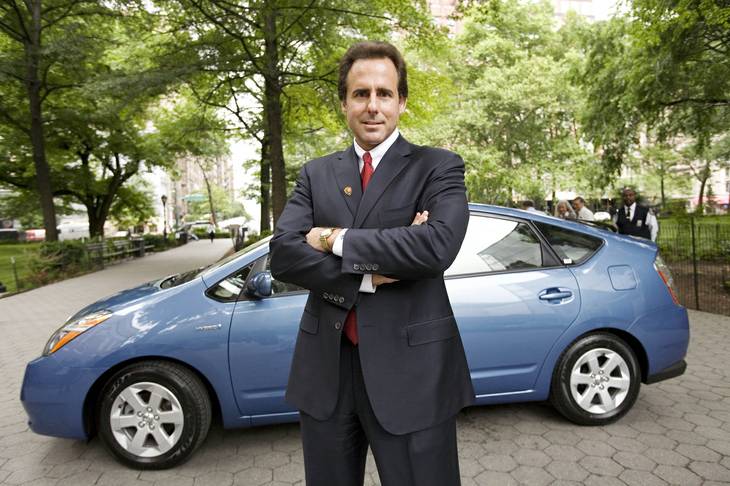Caesars Entertainment’s next chief executive left his last job after revelations of accounting problems at his company and calls for his resignation from some investors.
Mark Frissora, the Caesars CEO-designate who formerly headed the rental car company Hertz, now wades into another financially fraught corporate environment. The largest operating division of Caesars is trying to eliminate nearly $10 billion of debt through a complicated — and controversial — bankruptcy restructuring.
Nonetheless, Caesars executives and casino analysts seem relatively confident that Frissora can successfully take the reins from outgoing CEO Gary Loveman.
For one thing, Loveman is staying on as Caesars chairman, and the company said he would continue to oversee the restructuring process. Also, Frissora’s previous management experience, though outside the casino industry, isn’t as unrelated to his new post as it may initially appear.
Troubles at Hertz
When Frissora stepped down as chairman and CEO of Hertz Global Holdings in September, the company said he was leaving for “personal reasons.”
However, Hertz also was engulfed in some serious financial issues. In June, the company said in a filing with the Securities and Exchange Commission that it found some accounting errors regarding “certain non-fleet assets, allowances for doubtful accounts in Brazil, as well as other items.” In addition to mentioning that some other errors were found, Hertz said its financial statements for 2011 “should no longer be relied upon” and would need to be restated.
In late August, billionaire investor Carl Icahn, who acquired an 8.5 percent stake in Hertz, said he had a “lack of confidence in management.” A spokesman for another investor told Bloomberg News that Frissora made “some serious missteps, and it’s time for a change.”
In November — after Frissora stepped down — Hertz said it would also need to restate financial results for 2012 and 2013, and that it wouldn’t complete a financial audit until at least mid-2015.
A Hertz spokesman said he couldn’t comment on Frissora’s departure from the company. A Caesars spokesman also said he couldn’t comment on Frissora.
But in public announcements, both companies have taken care to outline the positive impact he had as the CEO of Hertz, despite the company’s problems.
"During Mark's tenure, Hertz has transformed from a single on-airport car rental brand to a world leading rental car company with a portfolio of brands that reach multiple consumer and business segments both on- and off-airport,” said Linda Fayne Levinson, independent non-executive chair of the Hertz board, in the statement announcing Frissora’s departure. “We appreciate his strong commitment to Hertz.”
When Caesars announced its appointment of Frissora on Wednesday, the company used similar rhetoric about Frissora leading an expansion of Hertz. That statement said he grew Hertz into a “global organization” with four retail brands and more than 3,000 off-airport locations on top of the airport part of the business.
Additonally, Frissora was credited with leading some major acquisitions, and Caesars noted that shareholder value at Hertz “increased significantly” under Frissora’s watch. Marc Rowan and David Bonderman, founders of principal Caesars shareholders Apollo Global Management and TPG Capital, gave him their full support.
"Mark has a long history of driving growth, optimizing operations and creating shareholder value," they said in the statement. "We are confident that his efforts combined with the restructuring of (Caesars Entertainment Operating Company) will help create long-term shareholder value at Caesars.”
Caesars said in a regulatory filing on Thursday that Frissora’s base salary would be $1.8 million, and a company bonus program could reward him with up to 150 percent of that. Loveman earned $7.6 million including bonuses in 2013.
No casino background, no problem
Frissora's lack of an extensive background as a casino industry executive isn’t totally unprecedented. Loveman, for example, was a Harvard economist before he came to Caesars, although he was chief operating officer for a few years until becoming CEO.
Chris Jones, an analyst for Union Gaming Group, says Caesars needs a strong leader who can “put the pieces back together” when the company emerges from bankruptcy. Jones also points out that Hertz is intricately connected to the travel industry — not too far removed from the tourism-heavy casino industry.
“You need somebody who’s capable of thinking in the big, broad strokes here as well,” Jones said. “The guy has a pretty decent pedigree.”
His background at Hertz could be useful at Caesars in other ways, too. Alex Bumazhny, an analyst for Fitch Ratings, said Frissora knows how to handle complicated databases. Data is a critically important part of running big casino companies — Caesars, for example, manages a loyalty program of more than 45 million members.
“With an organization like Caesars where it’s very database heavy, it seems like a lot of skills that the new CEO will bring in could be transferable,” Bumazhny said.
Plus, Frissora has some time to learn the ins and outs of running a massive casino company. He’s joining Caesars now as a member of the board of directors and the CEO-designate while he gets ready to take over on July 1.
And any lingering concerns about Frissora’s background will likely surface when he appears before gaming regulators, who still need to sign off on his appointment.
